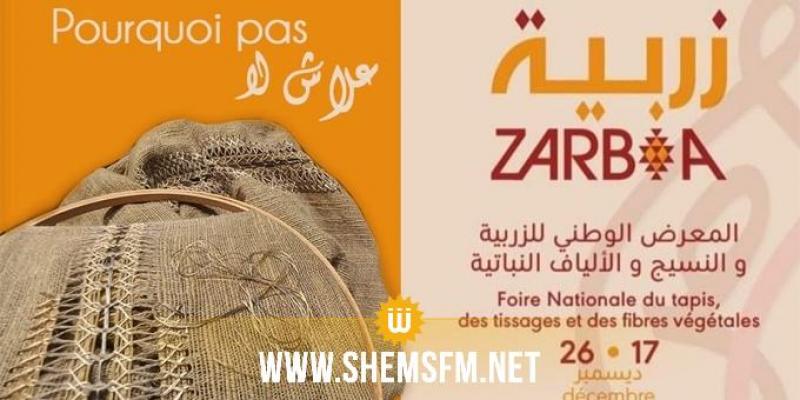Saturday, 10:30 am, the parking lot of the Kram Exhibition Park is full of cars.Halls are full of visitors.More than 115 craftsmen from different regions of the country exhibit their craft products.From copper weaving, from embroidery to traditional habit passing through tapestry ... A large choice is offered to customers.Several craftsmen are sitting in front of their stands.There are not many sales operations.Merchants chat with each other, listen to the radio, drink a coffee, answer questions from visitors who stop to examine the items but without buying.Despite everything, these craftsmen always hope to carry out a great sale operation.Approaching the stands, we discover displays stuffed with articles of different colors.Some craftsmen have not lost hope of achieving good turnover.They continue to welcome visitors with a big smile.They explain to customers the typical value of their articles and the originality of each exhibited part.

Zine Taamali, the sixties, former executive of the National Crafts office, specialist in the field of carpet and weaving from Béja, told us about her job with a furious and heartbreaking tone.He proudly showed us his articles: Halfa, Margoum, Klim carpet, without forgetting to mention the question of the rarity of the workforce in the craft sector."Nothing is more like before in this sector.Everything has been shaken up, "he whispers, bitter and he continues:" For the past ten years, the sector has suffered from several issues, including specialized labor, raw materials, marketing ... Personally, I think seriouslyto abandon this weaving profession and change career to bring my family to life.
A few meters from the stand from Zine Taamali, we meet Noureddine Benhmida, craftsman of Jerba Houmt Souk carpet.He has been working for 50 years.He talks about it with great pride.It was with his father and grandfather that he learned to put the nodes and to embroider.Today, it continues to produce beautiful items using traditional weaving techniques.Methods that resist despite the new trends and industrialization of weaving ".On the island of Djerba, crafts are an ancestral activity transmitted from father to son.We have an original culture and know-how specific to these activities.This culture is very rich and promising.But, unfortunately today, young people no longer want to learn this job, synonymous with patience and rigor.Nowadays, everything has changed, boys and girls continue their university studies.The sector suffers from a well-trained workforce, "explains Noureddine.
Our interlocutor and despite changes continues to defend his profession and fight for the continuity of this sector and especially Amazigh carpets.These carpets that require a lot of time and a great know-how to be made cost very expensive.The price of an average size carpet is 1.500 DT.
De son côté, Warda Saidi artisane de Tajerouine, 32 ans de carrière, parle sur un ton maussade de la concurrence entre petits et grands artisans."It's a real problem for me.I sell the meter at 60D while the renowned craftsmen market the square meter made between 250 and 300 dinars.In addition, as a small craftsmanship and rural woman, I encounter great difficulties in acquiring raw materials that become rare and expensive.I get a woolen in Ksar Hlal, "says the lady.
The craftsmanship speaks of the need to control the sector and closely monitor intermediaries, distribution circuits of raw materials and to market finished products.For her, it is necessary to sanction the intruders which can harm the profession."The future seems uncertain and problems have serious social consequences.We no longer have enough to live, nor what to pay for our bills.This situation has been dragging since the revolution without any improvement.We often hear in the media that we have made decisions to solve the problems of the craftsman's sector, but nothing has changed.From bad to worse, sales are in free fall and articles from the counterfeit floods markets and fairs, ”concludes Ms. Warda.
Elevage et pelleterie :
le lapin du Sahel
Partageant son inquiétude, Sassi Bechir est un créateur d’articles divers en peau de lapin, de mouton et de chèvre.An original farmer from the Sahel who started this work in the 80s with rabbit farming.His idea was to give value to the skin of the rabbit.In the 90s, he adopted a new technique to offer a second life to the skin of rabbit, then those of the goat and the cow.Currently, it produces and markets handbags, stuffed animals, leather and fur items.The raw material is the skin of farm animals.The prices of these products vary between 20d and 900D.Although the sector is promising and innovative, artisans have funding problems ”.Unfortunately, with the fall of the dinar, the prices of animal skin treatment products that come mainly from abroad continues to increase.We must seriously think of producing these substances in Tunisia to reduce production costs, ”said Béchir.
Fatma Samet or Fattouma as his relatives call him is the manager and the founder of the company Kerkenatiss, specialized in traditional clothing and craft fabrics.
L’artisane fabrique ces articles avec des filaments naturels.She uses traditional techniques in her native region.
Dans la confection de chaque pièce, la dame donne de son âme.She is interested in small details.She is always looking for perfection, which explains the prices of her exhibited clothes.The meter of fabric is sold at 80D.
A travers cette broderie, Fattouma a des raisons d’ordre surtout culturel et sociologique.It is involved in the cultural values of Kerkennah.Its objective is to highlight the artisanal know-how of the archipelago.She highlighted this artisanal heritage which can cause an economic boom in an island that suffers from several problems."This is my own battle as a Kerkenian woman for the promotion of my island," she said.








